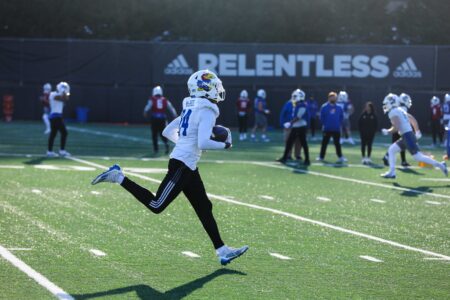Group publicly bashes NCAA system
Not everyone is a fan of the new Academic Progress Rate – the same reform system that may penalize Kansas University’s football and baseball programs this year.
The Drake Group, a nationwide collection of college-level faculty that strives to increase academic integrity among college sports, recently sent out a press release bashing the new APR system, saying “without full academic disclosure by each institution : there can be no true and accurate academic reform of intercollegiate athletics.”
Dr. B. David Ridpath, a professor at the University of Mississippi who doubles as executive director of The Drake Group, said that meant publicizing what classes student-athletes were taking, their teachers and academic advisors, and their grades in those classes.
Basically, everything but the athlete’s name would be disclosed under The Drake Group’s vision. Refraining from naming names, Ridpath said, would make the focus on the institution, not the athlete.
“Even to some of the most jaded viewers of college athletics, the APR in principle and on the surface sounds like a really good idea,” Ridpath said. “What we’re not getting at is what is going on under the surface.”
The APR keeps track of athletes staying eligible and in school by way of a point system. A score of 925 is thought to translate to an appealing graduation rate.
Ridpath, though, said there was more to it, and references a recent Washington Post story regarding Omar Williams, a basketball standout at George Washington University.
Williams has maintained eligibility at the elite private institution and reportedly is set to graduate in May, despite not graduating from high school, earning no grades at three different prep schools and being the subject of numerous sources saying he has no interest in academics.
“How is he making it at a school like George Washington?” Ridpath said. “We want full transparency of what’s going on behind the scenes.”
Ridpath said the APR was a baby step in the right direction. Further, he said The Drake Group’s problem was the belief the NCAA was satisfied with the APR being the driving force toward academic reform.
“If everything’s great,” Ridpath said, “let’s open the books.”
KU is set to lose scholarships in baseball and football for low APR scores unless a waiver filed by the athletic department overturns the penalties. As of Wednesday, KU had heard no update on the waiver.
Associate athletic director Paul Buskirk, who’s in charge of academic support for Kansas Athletics, Inc., said he hadn’t seen The Drake Group’s release, but didn’t seem particularly concerned if the NCAA would take their advice.
“We will follow the lead of whatever the presidents provide us,” Buskirk said. “We have nothing to hide. On our campus, there is no place to hide.”







